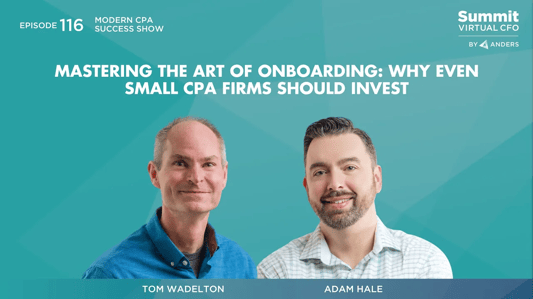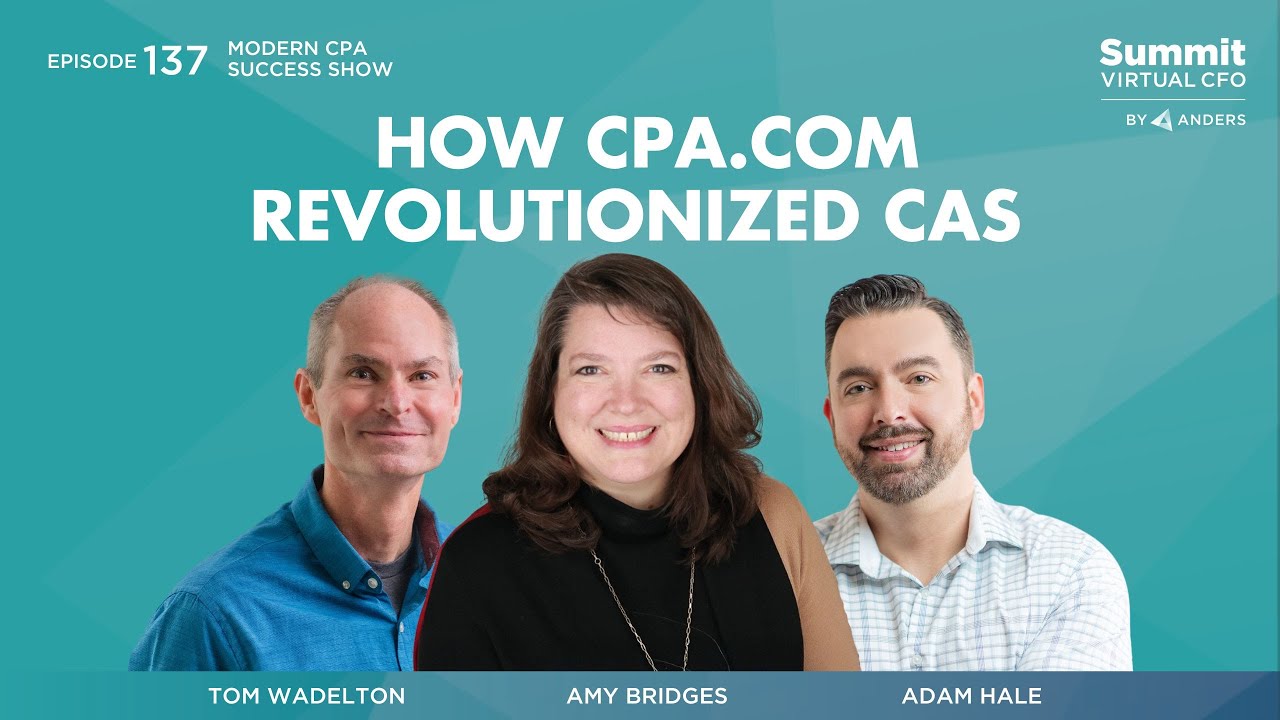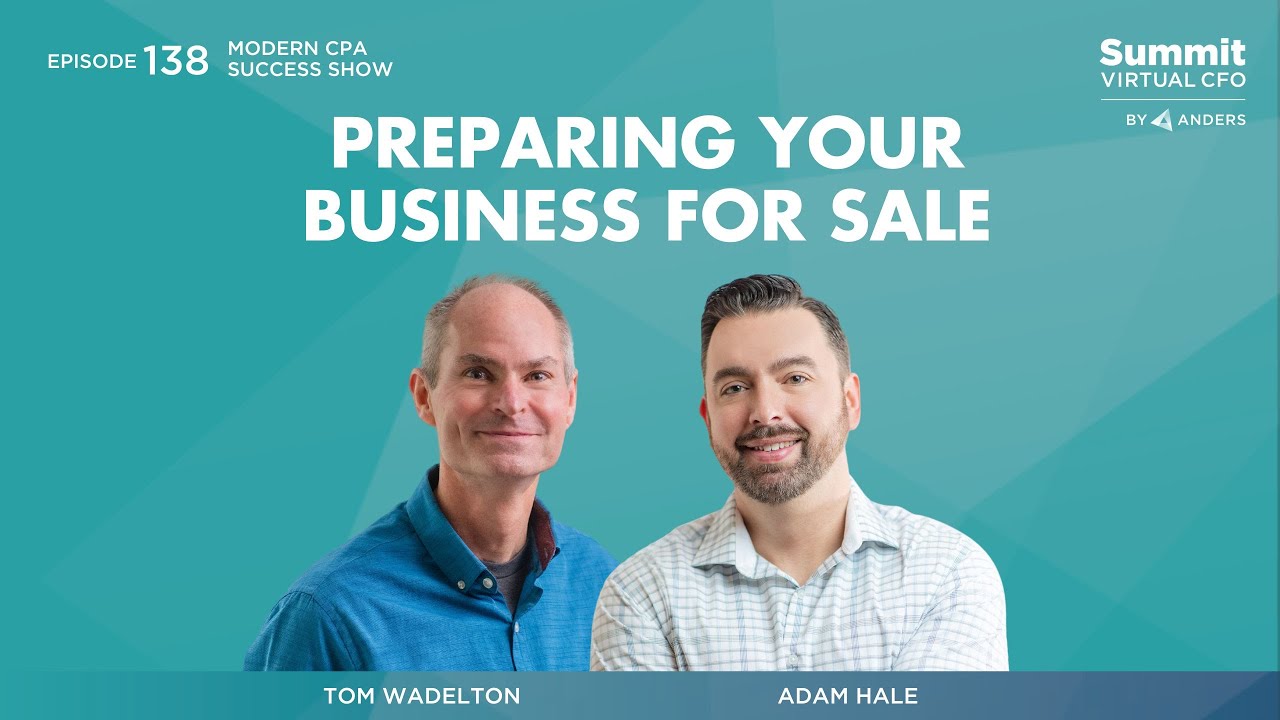The Modern CPA Success Show: Episode 116
Tom and Adam discuss the critical role of onboarding in accounting firms. They highlight the necessity of a structured approach to make a strong initial impression on new clients. Adam advocates for setting explicit expectations and developing a systematic onboarding procedure, while Tom details activities like accounting and advisory discovery. They explore the contributions of project management and client success managers in streamlining the onboarding experience. The conversation also covers the importance of continuously refining the onboarding process to ensure client contentment, underlining its influence on enduring client relationships and the firm's prosperity.
Intro (00:00:00) - Welcome to the Modern CPA Success Show, the podcast dedicated to helping accounting firms stay ahead of the curve. Our mission is to provide you with the latest and greatest insights on cutting edge tools, innovative marketing strategies, virtual CFO services, and alternative billing methods. Join us as we change the way people think about accounting.
Tom (00:00:22) - Adam, how are you doing today?
Adam (00:00:24) - Excellent. Thanks for asking. Other than it's starting to get a little cold, so yeah, that's kind of a bummer.
Tom (00:00:28) - It's been a quick change for us. All of a sudden we're coming into that hibernation season with modern CPA success we're trying something kind of new with shorts, where we just get a chance to talk about topics. And the one I want to throw out to you today is onboarding. So, maybe talk a little bit about the importance of it. And I'm happy to share in that conversation. But I did want to kind of limit to say if I was a small firm and let me say, what if I had like a six person CFO team, so say it's a CFO, maybe two seniors and three accountants, and I don't really do a good job of onboarding brand new clients, kind of how would you approach that? So, maybe start with the importance of onboarding and what we get done.
Tom (00:01:05) - And then we can move to that. Does that work?
Adam (00:01:07) - Yeah. I mean it's going to be a challenge to do this in like a short. But I'll do my best. Yeah. So, because it's a big topic. Yeah. At the end of the day, it's first impressions. So, you've done a great job in the sales process you've sold the client on, you know, your ideology and how you're going to help them. And now you got to get started. And if you know, get a flat tire those first couple of weeks it's just going to really resonate through the entire, you know, you're just never going to be able to win back that trust. So, here's an opportunity for you to just get off on the right foot and get things rolling. And of course, what it's going to require, though, is setting expectations from the client like you do need to make a process for it. It's one of those things where you can't just say, hey, great, it's all going to be custom solutions, and I'm just going to walk in and do what the client needs me to do because they told me they need this.
Adam (00:01:58) - They need that. Now you're going to have to sit down and create a process, whether that process is a one-week process or a ten-week process, whatever it looks like, you want to create a process. You want to have things that are just table stakes that you have to get done during that timing. And the importance of that is then you can go back and communicate to the client of, this is what we're going to get done.
Tom (00:02:21) - Yeah, exactly. And if I just add if I can tell people kind of how we look at it in our sales process, we tell people it takes about 6 to 8 weeks. And when we do the kickoff, we say, here's what we'll do. But we have two activities that are important. And we say, we'll do an accounting discovery and we'll do advisory discovery. So accounting discovery, let's take a look at your books and see what they look like is Adam, I think you've said it well, everyone says my books are in good shape.
Tom (00:02:46) - A few of them are right. And so, you can get in and say, wow, these things are a disaster. The advisory discovery is really learning about the client. But setting yourself up to be a good consultant, right? How much are they trying to grow? What are their struggles, things like that. And then we say, usually it's after about three weeks or so, we'll come back and give you specific dates. And so, we'll say we I just did one of these yesterday. Here's what we learned in the accounting discovery. Here's what we learned in the advisory. And so, here's when we're going to have your forecast on your pipeline done. Chart of accounts done. Clean up I'm kind of all these things where we put dates along those. And so, you've done a second step to sort of let them know we've taken a look under the hood. And here's what it's going to look like.
Adam (00:03:24) - Yeah. And it also gives the client an opportunity to reprioritize. if you've put those dates in place, they're like, hey, I need this.
Adam (00:03:31) - And then you can give them the feedback of like, no, unfortunately I have to do A, B, and C before I can do D, you know, so you can have that conversation. Maybe they help you, maybe they remove some blockers. They get more involved in the onboarding. But having those kind of discovery meetings, even if you did a discovery, you know, for some people they do them before the sales process. For us we have a one call sales closed process. And so we don't do the discovery beforehand. So if you do the discovery pre make sure that you get enough information to your point that you can go ahead and line that stuff up. Because for us, even with a big team we really struggled. We used to always say, hey, one team goes backwards, and one team goes forwards. You know somebody cleans it up, does all the accounting, the other team starts focusing on forward stuff. Well, one of the challenges with that is it's really hard to go forward without having the back stuff, you know, digested and, and clean.
Adam (00:04:25) - And so again, to your point, yes, clients are rarely clean. And even if they are, you still have to. There's a certain amount of work that you have to do to understand where they're at currently and where they've been, so that you can leverage that information to do the advisory. So us breaking it into those two pieces for the client and then laying out kind of a new plan, we tell them upfront to your point, hey, here's the estimate of time, but we're going to do these things really quick at the beginning, and then we're going to come back to you with the kind of the master plan and the dates. So that's really important.
Tom (00:04:56) - I agree. And you said something that made me realize an important. Thing we talked about aligning on priorities. The client I met with yesterday was fantastic with the giving us access to all the information. You know, Banks and QDO, many of our clients aren't. And so, some of these initial meetings are a great chance to, you know, you may set the dates out later, but then tell them, hey, if it took you three weeks to get us access to Cuba and you're still looking for all these things, you are delaying us.
Tom (00:05:19) - Because if I tell them from the very or if they remember 6 to 8 weeks, that's me saying it usually does take three weeks. But when or six, if it took me three to get access, I can't get it done. So, it's a good chance to push on them. Or it could be them not wanting to meet with you, or all sorts of barriers that you're letting them know of. So I'm curious with that six person team, if you were walking in and saying, okay, I'm in charge of this and we don't have a process, how might you decide to organize the work among those people and get yourself to where you're saying, I can do the best onboarding with this existing team?
Adam (00:05:51) - Yeah, I mean, I think that I mean, and again, if you're a six-person team, you're probably not going to have the entire team dedicated to this new client. Maybe you do. Maybe you don't. Yeah. but I think whatever size team you decide to bring to the client, that onboarding team, I think that the entire team needs to be focused on one area together and then the other, because again, our direction was, hey, we'll just go in two different directions.
Adam (00:06:14) - The CFO can go this way, the accountant can go that way, and it's just chaos. And so even though you might not say that that's the long term role of the CFO or the long term role of the it's the senior accountant or accountant that's on the client, it's better if you kind of instead of dividing and conquering, if you if you come up with like that's how I would attack the process, I'd say, hey, we're all going to focus on this and then we're going to do this, and then we're all going to focus on this, and then we're going to deliver that. You know, that's kind of how I would set it up. in terms of. You know, making sure that you have a really solid process. I mean, you're going to want to spend a lot of time and you're going to get it wrong. Right? So we've been evolving and changing this process for 15 years. And we're still not 100% perfect. So just keep in mind put it together, learn from your mistakes.
Adam (00:07:06) - Make sure you do kind of a postmortem on onboarding, which is also a great point to at the. So it's really important to get a kickoff call on. So like if you are building a process it should be uncapped with you should have a kickoff call. And then you should have, you know, an off boarding call. So, that onboarding initial kickoff call you're going to it's a meet and greet of the team. It's a really you know, a realignment on making sure like these are the things we're doing. You can set the stage for what you're doing. It's also a huge opportunity to make sure, because this is often an issue, is setting bright lines around communication policies like, hey, we respond same day, we respond next day. Whatever your policy is. However, you're going to do that, make sure you just you can't drill that home enough. You really shouldn't drill at home in the sales process. But this is an opportunity on the kickoff call to go, hey, and remember, we respond same day, but we're not going to respond within 15 minutes.
Adam (00:08:04) - You know, I think Tom, it was maybe it was I think it's one of your clients I was on just recently, where they were like, they were like, well, you know, Tom used to respond to me like within 10 or 15 minutes. And I was like, well, because he had the opportunity to, but that's not the policy. Remember, our policy is same day. Maybe not the answer, but acknowledgement or receipt. And when we'll get back to you and they're like, oh yeah, I guess that is the policy. We just kind of got spoiled. And I'm like, but that happens, you know what I mean? So, that's so but if you've made it clear at the beginning it's easier to reinforce, down the road, you know, again, that client's been a client for like five years, you know. So, that was a great opportunity. and then the off-boardingng meeting, the reason why that's so important is because what you'll hear if you don't do that is, man, I feel like I've been an onboarding because you're always going to be working with the client to do new cool things.
Adam (00:09:00) - So technically you have to be, you have to define what end means, like paint. What done means is, you know, kind of the phrase that is used a lot, like show the client done means I've stood up your financials, I've stubbed your forecast. At that point. All this other work's been done in order to get to this stage. And that's officially the end of onboarding. Anything we work on beyond that is always just going to be part of our normal recurring service. And so, you have that onboarding meeting to say, hey, we delivered this. We delivered that. We did this, this, this and this. Let's go.
Tom (00:09:33) - Yep, yep.
Tom (00:10:16) - And often for us, when we can produce or when we do produce the first financial statement, most of those onboarding things are done. And that often marks the end, right? It's comparing it to a forecast that I've built. I've done the accounting cleanup. We've got access to everything. Most of those things are in place that that's around the time that we do it. In addition to what you said, Adam, from a process standpoint, I think one thing I might add, if I had that team is I would probably does one of those people and say, you're my project manager for onboarding, and I'd probably pick maybe a senior accountant who's really good at communications. Okay, you've got the beginning of the end. I want you to keep us on task so that we could do internal meetings. And they're saying, are we staying on top of these things throughout? And one of the things we do, I think it's really good is once per week, we send an email to the client saying, here's where we are.
Tom (00:11:02) - Here are blockers that are in our way, kind of here's some issues we're dealing with. So the clients are getting this sort of constant information about what's going on. What are your thoughts on that approach?
Adam (00:11:11) - Yeah, I'd probably push back on that a little bit. I would say that the people doing the work inherently not always true, aren't great at project managing themselves, whether it's a Senior Accountant, Accountant, a CFO. I just don't feel like they're and don't get me wrong, like, we're very analytical people. So, you think we'd be super structured, but have you ever walked into an accountant's office and just seen all the, the, the, the file stacking everywhere all over the place? It's like, yeah. So, you know, so what I would say and what I've seen with small, with small firms, you know, people with 3 or 4 people, what seems to generally be true with most of them. And I know this is maybe changed now with virtual assistants, but generally speaking, most of them used to have like a receptionist or an administrator or somebody that was actually really good at non-technical stuff.
Adam (00:12:04) - So to me, that role and for us is non-technical, right? We have client service managers that turn into account managers. And so, if you take somebody that is hyper organized, that is very good at like keeping your schedule tight, you know, doing all the administrative stuff and not getting caught in the minutia of what has to go on. Now, you've got to give them some authority, right? You got to be able to tell them, like it's your responsibility to communicate back results to the client, but also to make sure that the team's doing what they're doing. So, it's like Tom, you said you were going to get this done. Did you get it done? Why not? Yeah. What date can I give the client that this will be done and why did it get pushed. You know what I mean. And so, and then holding even if you're the owner, you're the CFO. This person has to be able to have that conversation with you and you have to, you know give them the respect of, of doing that.
Adam (00:12:53) - So I would say if you have a firm administrator, if you have that person that's like, has that organizational skill that probably is lacking in most of your rest of your team and is non-technical. That's who I would go, hey, you know what? On these new projects, I need you there. And then eventually maybe you can hire for that position like we've done. And or, you know, if you're picking up a lot of clients and, or maybe you can figure out a way to do it with a virtual assistant. Keep in mind that, you know, they might not have the human experience with you to be able to hold you accountable as tough, but it's still possible to find those people online as well.
Tom (00:13:29) - Yeah, yeah, that is an important role. I will give you a hard time though, because I gave you a six-person team and you picked the seventh person said, I'll pull someone in.
Adam (00:13:38) - You said they're a six-person team.
Adam (00:13:39) - They're already on the team. That's my point.
Tom (00:13:41) - Okay. That's fair. You did highlight though, and we have found as we've hired our Customer Success Manager or Client Success Manager such an important role. And I think one of the things about them not being technical is they communicate really well to the clients, where we would probably use really technical language about why things get done, and they're pretty good about sort of explain it to me in English, because I've got to tell a client who is not an accountant what's going on and do this stuff, and that's an important role.
Adam (00:14:07) - Yeah. And if you're wondering about affordability, ultimately as you grow and you scale how we've been able to multi-purpose that role was yes, the project management piece of it. But then we call them Client Success Managers because they're the ones that also have a pulse on the team. So sometimes the team will be like, hey, you know, that meeting went terrible, or I wasn't getting good vibes. Do you mind reaching out to the client or we do, you know, monthly surveys for our clients and we just say, hey.
Adam (00:14:32) - How's everything going? Yellow, red or green? If you get a yellow or red, they're a point of escalation. They reach out to the client immediately because you might not have time. You're busy all day, Tom. You're like, oh, yeah, I saw that come through. I meant to get Ahold of them. Yeah, somebody super ticked and they gave you a red. And they do that on a Tuesday, and it takes you till Friday to get back to them. Yeah, that's been a disaster. So, this person outside of all those meetings can reach out and not solve the problem, but just listen to it, document it, get back to the rest of the team. So that's how we've been able to kind of make the role more affordable. Even if you were a smaller shop.
Tom (00:15:08) - Yeah, yeah and to your point on that, I've had a number of clients compliment the way that we do ask nicely that survey. And they say, I love how easy it is.
Tom (00:15:16) - And every time I tell them, if you're not prepared to follow up when you get an answer that you don't want, don't do the survey. The worst thing is your example at them, right? Get someone to give you bad feedback and then don't follow up on it and you'll be in a worse position for that. So that'd be my advice around that. But yeah, to me, one of the key things you said, and I think it's totally true, is that onboarding is so important and it's constantly evolving. It's always on the radar to say, how can we do this better? And I think it's from what you said at the beginning, it is such an important initial impression for that client that if it goes well, you've got a client who loves you from the beginning and you can really hold on to that. And if you do it poorly, man, you're working so hard to try to win that client over after a bad initial experience.
Adam (00:15:59) - Absolutely. Yeah. Towards the end.
Adam (00:16:01) - Yeah. Even if you if you have one small mistake six months from now, they come right back to. You know, then onboarding was just so terrible I can't tell you, you know how many times I've heard that and I'm like what I thought we were like well beyond that. So, the scars definitely cut deep with onboarding. And so, first impressions mean a lot. And definitely my advice would be overall have a process and make sure that the entire team that you have on the permanent team is involved in that. And they focus on the same things together in order to kind of work through it.
Tom (00:16:38) - Thank you. I think that's a perfect place for us to stop our discussion today. Thanks, Adam.
Adam (00:16:43) - Yeah. Thanks, Tom.
Intro (00:16:44) - Enjoy this podcast. Visit our website SummitCPA.net to get more tips and strategy for achieving Modern CPA firm success. We are here to be a resource in this ever-changing industry.

.png?width=120&height=77&name=Summit-Virtual-CFO_color_rgb%20(1).png)












